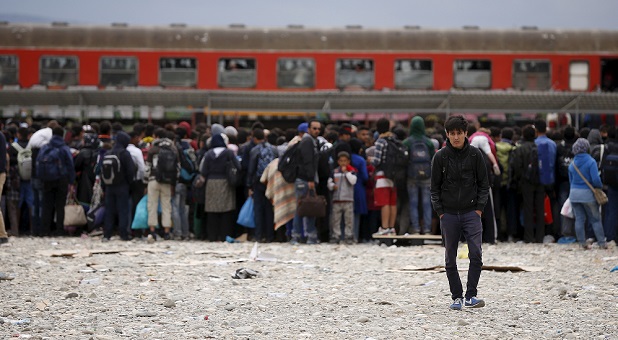On Thursday, the House of Representatives overwhelmingly passed without much consideration a proposal that would require some additional FBI scrutiny for about 10,000 refugees from the war in Syria and Iraq over concerns that they cannot be properly vetted because of inadequate intelligence on who the bad guys are.
Those concerns were emphasized earlier last week when it was revealed that at least one of the Paris bombers was carrying a passport masquerading as a refugee.
The issue itself was also presciently highlighted in October by FBI director James Comey in testimony before the House Committee on Homeland Security. “We can only query against that which we have collected,” Comey said. “And so if someone has never made a ripple in the pond in Syria in a way that would get their identity or their interest reflected in our database, we can query our database until the cows come home, but there will be nothing show up because we have no record of them.”
In essence, the intel on Syrian refugees may not even be that good. And unless the government stumbled on a hotbed of solid intel in the past month, the bill the House just passed is practically meaningless too. It is little more than a feel-good, knee-jerk measure, akin to the rubber stamp most tourists get on their passports at the airport when they enter the U.S.
Speaking of which, the bill itself has a severe flaw, which is that it ignores the vast majority of people—hundreds of thousands—who travel to the U.S. every single year from North Africa, the Middle East and Asia with regular visas.
For example, in 2014, according to data compiled by the U.S. Department of State, the U.S. accepted 1,984 visas from Syria, 2,181 from Iraq, 3,858 from Jordan, 2,008 from Lebanon, 7,049 from Iran and so forth.
The legislation that just passed the House will not include any
If we don’t have adequate intel on the refugees, then how do we have adequate intel on everyone else traveling from that region?
The whole approach has an obvious loophole, said Americans for Limited Government President Rick Manning in a Nov. 18 statement blasting the legislation: “Even if they make it harder to qualify as a refugee, the fact is our borders—thanks to our open-ended visa program—are still wide open. The enemy will just apply for employment, student or basic travel visas. The 9/11 hijackers were all on legal visas, not pretending to be refugees seeking asylum.”
So, let’s back up for just a moment and consider the futility of what the House just did.
The FBI does not have adequate intelligence to vet refugees or anybody else coming out of the region. 10,000 refugees are expected in the next year, plus more than 200,000 additional travelers from the wider region on regular visas. The House passes a bill to do additional background checks on the 10,000 for which there may not be that much data to query, all the while ignoring the more than 200,000 who will pass through our airports will little trouble.
Which group is Islamic State, al-Qaida and other fighters more likely to hide among? The now high-profile refugees, or the walking-through-the-airports-
“This seems like a cynical joke rather than a serious effort to beef up security,” Manning said.
“That is why if Congress is truly serious about this issue, they will restrict travel on the basis of region where the enemy is traveling out of until this situation is sorted, the war has ended and the enemy is eliminated. Having open-ended immigration from countries you are at war with is exceptionally unwise,” Manning declared.
Contrast that with after 9/11 when Congress overwhelmingly passed the Patriot Act. Leaving its flaws aside for a moment, they were acting to close what was perceived at the time as a major security loophole, the so-called “wall” separating intelligence and law enforcement. Say what one will about it—Americans for Limited Government has been very critical of the unconstitutional mass surveillance the legislation encodes—it was a serious effort at counterterrorism.
Instead, in the wake of the Paris attacks, you have members and state governors running around complaining about 10,000 refugees because of intelligence gaps all the while ignoring the hundreds of thousands of immigrants and travelers coming in from that region via our open-ended visa system.
It proves that Congress is simply posturing on this issue and playing to the crowd. This is as cynical as it gets. Political theater and nothing more. Manning is right.
If they want to restrict travel, then restrict travel, but don’t slap on a tepid round of scrutiny on a minute fraction of the problem and then go around acting like some big security loophole has been closed. What a joke.
In the meantime, President Obama has promised to veto the meaningless legislation, which moves to the Senate for more meaningless votes. But barring a major amendment to the bill, it won’t make a single bit of difference, so can we talk about something else now? {eoa}
Robert Romano is the senior editor of Americans for Limited Government.
See an error in this article?
To contact us or to submit an article





















